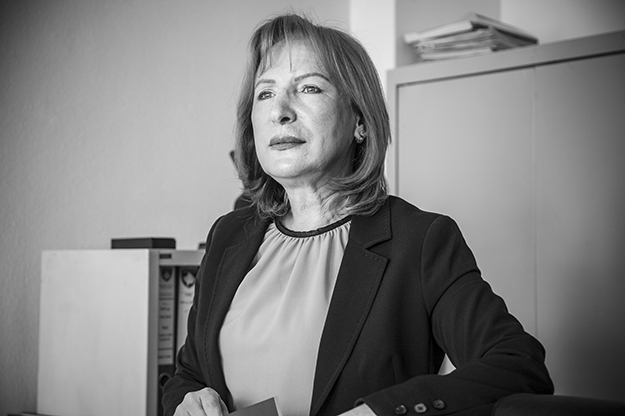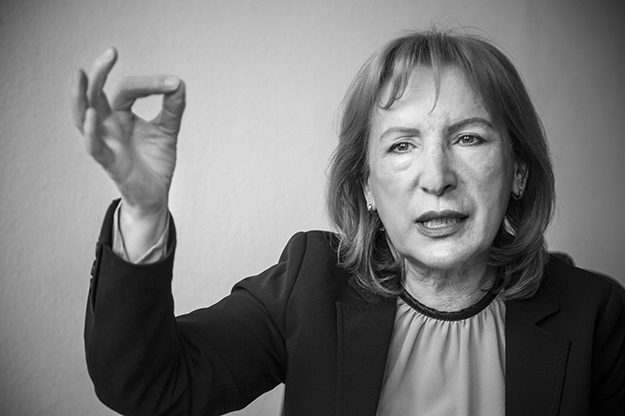Her office looks like an archive, except it is much messier. Many cases have found their way onto Special Prosecutor Drita Hajdari’s desk. From high level corruption, to terrorism and war crimes, Hajdari has plenty of each — even some that are considered national priorities.
She barely leaves her desk as she gestures with her hand to invite K2.0’s staff inside. Dressed in black, she speaks about the cases she has been working on recently — war crimes from the war in ’99 in Kosovo — cases that, according to her, have been left in the dark now for 18 years.
A prosecutor since 1999, Hajdari was promoted to the position of special prosecutor in 2013. Two years later she was chosen to coordinate the state prosecutor’s newly created Department for War Crimes, following the transfer of competencies for handling war crimes cases to local institutions from EULEX in 2015, which itself inherited the competencies from UNMIK in 2008. Since taking on her new role she has been unable to leave her house or office without two bodyguards provided by Kosovo Police being by her side at all times, even at weekends.

Photo: Majlinda Hoxha / K2.0.
Three hundred cases have been undertaken by the Special Prosecution’s Department for War Crimes since its formation, among them cases of murder, rape and massacres. Eighty four are currently under investigation, of which 49 were handed over by EULEX in 2016 following the transfer of competencies.
However last year only two indictments were filed by local institutions, and even this number might not be reached this year as a consequence of Kosovo’s inability to cooperate judicially with Serbia in order to bring war crime perpetrators before Kosovar justice. Hajdari insists that the time has come for Serbian army commanders to be prosecuted for these and many more crimes that were committed by Serbian forces in Kosovo.
K2.0 met Hajdari to speak about the difficulties of solving cases of crimes that have been committed during the war in Kosovo. The prosecutor also speaks about investigations into national priority cases that she is leading, including the war crimes case against NISMA leader, Fatmir Limaj; the “fraud while holding official office” case against former head of the Constitutional Court and University of Prishtina rector, Enver Hasani; the misuse of official position case against the former head of the Appeals Court, Sali Mekaj; as well as the “Pronto” affair, in which top government figures were heard in a series of leaked wiretapped conversations to be conspiring to misuse their positions.
Regarding the latter, Hajdari says she does not yet know whether there will be an indictment filed against PDK deputy Adem Grabovci, the main protagonist in this scandal. She says that some of the deals that he made to insert party affiliates into public office positions were never implemented.

Photo: Majlinda Hoxha / K2.0.
In a wide-ranging interview, Hajdari also discusses chronic staff shortages, the timing of the decision to hand war crimes competencies to local institutions and the potential for prosecuting Serbian line-command officers where individual perpetrators cannot be identified.
K2.0: In 2015 you were appointed as a coordinator of the Department for War Crimes at the Special Prosecution. Can you tell us what war crimes are?
Drita Hajdari: War crimes differ from other crimes because of the fact that they are committed in situations of war. At a time of peace, if a person steals something from the house of another person, for example a car, it is a random penal act, but in circumstances of war it is a war crime, because of the utilization of the extraordinary circumstances — the war — in committing the crime. The same goes for murders, sexual violence, physical abuse… They are acts that are committed and not justified by military need, such as the killing or mistreatment of prisoners of war and civilians, especially of women and children.
What cases are you working on with the Department for War Crimes?
Three hundred cases have been registered in our department up until now, although 84 of them are still registered in the PPS registry [the prosecution’s database of all cases that are still under investigation]. Of those, 49 cases have been received from EULEX. We [the Special Prosecution Office of Kosovo] started to receive these cases from EULEX in 2016.
Among them we also received cases for which rulings have been made for the initiation of investigations, and they have come very close to the two year investigative limit. There is a set time period for conducting penal procedures — the period for conducting investigations is 2 years, and if no evidence is found, cases are closed.
Our initial reaction after receiving these cases, so as to not lose them, was to file requests [to the Court] for continuing these investigations. However, you must bear in mind that when we do file requests for continuing investigations for 6 months — that is how much [extension] we’re entitled to — you must offer justifications and explain why sufficient investigations have not been conducted within those two years, and why the investigations must continue.
I think that as a prosecution we have proven ourselves to be brave and professional in conducting war crimes cases with no regard to ethnicity or official position.
What did you do in these cases?
We said that the perpetrators were not found, and that we needed more time to find them, because as we know most of them are in Serbia. Then we also said that there are witnesses that are currently outside of Kosovo, and that we must hear what they have to say as well, through international judicial cooperation, and so on…
But you have not accepted only cases in which the defendants are Serbs — you also have the case of Fatmir Limaj, an Albanian.
The Limaj case has also been worked on, initially by UNMIK. Then EULEX made a ruling for investigation, and it was given to us with a very short period of [the two year] investigation time [remaining]. It was given to us about one month before the prescribed period ended, and then we had to request permission to continue investigations for 6 months and to find a justification. In this case the main reason was that the key witness was in Germany, and as such had to be interviewed through international judicial cooperation, and we had to find new evidence.
This was the Bellanica case [involving the murder of two civilians, Ramiz Hoxha from the village of Bellanica, and Selman Binishi from the village of Banja, in the Municipality of Malisheva. On October 2, 1998, they were taken near the mosque in Bellanica village and executed at the entrance of the village of Kravasar.]
With this case, I think that as a prosecution we have proven ourselves to be brave and professional in conducting war crimes cases with no regard to ethnicity or official position. I highlight this because after the war, one of the reasons that was used to justify not giving war crime cases to locals was that locals [Kosovar Albanians] would not process Albanians for war crimes. Now it turns out that we are ready…
You said that you have 300 war crimes cases. How many indictments have you filed, and for what crimes?
Before answering this question, I feel it is reasonable to highlight that I have worked as a prosecutor in ’99 and 2000 as well, and during that time we handled war crimes cases and filed indictments — a number of them are still being processed. But back then [in the period after the war] UNMIK took those cases because they felt that we weren’t ready to process these cases. Why? I do not know. It was a decision that was made by UNMIK and which resulted in exclusive competencies for UNMIK in dealing with war crime cases.
It’s as if people thought that because they were under the competencies of the internationals, we need not deal with those cases.
…and what happened with those cases?
They [UNMIK] worked very little [on these cases]. We had a few trials here and there. As I’ve said in public many times as well, this campaign [for prosecuting war crimes] has been in the dark. Very little has been said about it.
I am critical of the media and journalists as well in this respect — they did not care. I didn’t see media publications or interest regarding these cases that UNMIK took over at that time. They reported whenever there was a trial, and they were content. Now that we have the competencies, trust me, sometimes I can’t even answer the questions that they make [because there are so many]. Sometimes I just want to ask them: Where have you been until now?
But there was a lack of transparency regarding these cases…
… there was no interest either. It’s as if people thought that because they were under the competencies of the internationals, we need not deal with those cases. The fact that no one was interested up until now troubles and angers me, because pressure from the media and the public could have produced effects in the form of internationals doing a better job and giving a bigger contribution in this field.
Nevertheless, these cases are under your competencies, and you are only two prosecutors who are processing 300 cases. How achievable is this for you practically, knowing the nature of war crimes?
This small number of prosecutors in the war crimes field is a consequence of the insufficient number of special prosecutors in this prosecution. We still work with halved capacities. According to the needs of this prosecution, 18 prosecutors should have been here, whereas we function with half of the planned capacities. Besides war crimes, me and my colleague Elez Blakaj also work on other cases. I personally have cases that are in the judicial process, but I also have a few that are under investigation, like cases of money laundering, terrorism, the “Pronto” case…
How is it that for 18 years after the end of the war, international missions did not trust us enough to give us these cases, and now suddenly, overnight, they’ve decided to hand them over to us?
We have questions for those cases as well, although we’d like to continue on the topic of war crimes before that. We’re still interested to know how many indictments for war crimes you’ve filed as a department? We ask this because there was criticism that in 2016 you only filed two indictments, and that the number of war crime cases that were being treated was decreasing in general. There are complaints from family members of victims that negligence has caused them to lose trust in finding justice, because according to them, the state has not done its best. You are a part of the state, so why have we not done enough to bring war crimes to light, 18 years after the end of the war?
I just started answering. Initially these cases were under the competencies of UNMIK, then of EULEX — and you said yourself that there was no transparency at that time. But my question is this, how is it that for 18 years after the end of the war, international missions did not trust us enough to give us these cases, and now suddenly, overnight, they’ve decided to hand them over to us? Where did this trust come from? We are the same people that were working in ’99 and 2000 as well.
Indictments have been filed in two cases, and they are indictments against Albanians, but I’m telling you, if something doesn’t change in the perception of the need for changing the approach of the state, the government and the policymakers in this field, then next year we will not be able to file any indictments.

Photo: Majlinda Hoxha / K2.0.
We can file indictments against people that are in Kosovo, and they are Albanians. But what I often highlight, and want to highlight again, is that an overwhelming majority of the perpetrators are in Serbia. Just like Kosovo [which refuses to extradite alleged perpetrators to Serbia], Serbia also refuses to extradite them. There is no judicial cooperation.
Also, there is a lot of work to be done before filing indictments. We need to identify the person, find their home address. According to the law, in order to issue a warrant, you must first send an invitation to that person [for an interview]. You need to know more about that person, such as where they live, whether they are married, employed, what their economic status is, whether they have children etc. So it’s not just about a name and a surname.
Then if that party fails to accept the invitation, we go with a local warrant, which cannot be implemented because the person is not in Kosovo. But the law obliges me to issue a local warrant before taking any further steps. Only then can we issue an international warrant.
Logically, based on what you’re saying and knowing that Kosovo has no judicial cooperation with Serbia, does that mean that prosecuting Serbs for crimes that they committed against the civil populace in Kosovo is practically impossible?
Impossible.
Why then, have cases been given from international institutions to local ones — which accepted them — when we know that international missions for rule of law had, and continue to have, judicial cooperation with Serbia and local institutions do not?
They [international rule of law missions] had memorandums of cooperation too. This is what I am asking as well. Why? I don’t know.
In principle I am very against Serbia trying citizens of Kosovo for war crimes because they did not fight in Serbia, they fought in Kosovo.
Is there a solution for this situation?
There is only one solution. I want to be completely transparent and to explain to Kosovo’s citizens — among which are also family members of victims of war crimes — that if we do not have judicial cooperation with Serbia, with Serbia’s prosecution for war crimes, these penal acts will remain unsolved. We will gather evidence and try, but getting to the perpetrators of these penal acts will be impossible. Meanwhile, witnesses are either getting older, dying, forgetting, or even losing trust, and as such hesitating to testify. We are late.
However, Bosnia, Montenegro and Croatia have memorandums with Serbia’s war crimes prosecution. Based on written memorandums, for example the one between Serbia and Bosnia, this issue is regulated in a way that obliged each state to try people according to their citizenship. If we were to make such a memorandum, according to the analogy of Bosnia and Serbia, it would mean that Serbia would try war criminals that were Serbian citizens, and Kosovo would try Kosovar citizens that were suspected of committing war crimes. This is one of the options.
Another option regarding the issue of memorandums on reciprocity would be that [Serbia would be obliged to provide information on crimes committed by Serbs and] Kosovo would have to give information about crimes that were committed by Kosovar Albanians. How do you think such an agreement would be received by the general public, and do you think local policymakers are ready to take such a step, bearing in mind the judgement and the backlash that it could result in?
I want to highlight that in principle I am very against Serbia trying citizens of Kosovo for war crimes because they did not fight in Serbia, they fought in Kosovo. And if there is evidence against them, the country in which they must be tried is Kosovo….
…but there were some cases in which Kosovar Albanians were trialed in Serbia…
… Yes, there were cases like that, but that is not our fault. You should seek an answer for that from the government, the dialogue group, who have never raised this issue and didn’t oppose the Special Law of Serbia in 2003, which created a legal basis for trying citizens of Kosovo, Croatia, Bosnia and Montenegro — for former-Yugoslavia. We stayed silent and they conducted trials, as the recent case with Ramush Haradinaj shows. They acted upon the basis of that law in this case as well.
You have also undertaken cases of sexual violence in wartime. Can you tell us how many of those cases you have, and what progress you’ve made with them?
We have 23 cases of sexual violence. Most of them were committed by groups of paramilitary police and others. Young girls were taken from their houses and sent to houses where people were waiting to rape them in the most beastly, disgusting, humiliating way, and then they were terribly physically abused. I’ll mention only one case in which a girl’s nipples were bitten off during intercourse. Most of these cases happened in rural areas in which women did not speak Serbian, but even if they did, how could they identify the perpetrators?
Very rarely do perpetrators refer to one another by name. In most cases they had their faces painted. In most cases women do not even know how to describe the uniforms that they wore. In most cases, because of stress and terror, they forget, and they cannot physically describe the perpetrators. Now tell me, how do we bring these cases to light? How do we identify them?

Photo: Majlinda Hoxha / K2.0.
I have undertaken 23 cases because I thought that as a woman, women victims would find it easier to speak to me and to give me information regarding these cases. This was also a challenge. I also asked the police for these victims to be interviewed by women. I also requested — and my request was accepted — for victims to be registered in the police and prosecution [victims] databases with their initials only.
There are obstacles, because victims hesitate to talk about these events. They want to forget the horror. They are registered in NGOs, and they are afraid of revealing their identities by coming to the prosecution. There are cases in which their children or husbands have no idea about the crimes that were committed against them. Then there are cases in which they were raped in the presence of their families. Dreadful…
You said that you are having problems with identifying individual perpetrators. But have you managed to find out in which zones there were most cases of rape, and which brigades or police units or paramilitary groups operated in those zones?
That is precisely my idea. In cases in which we are unable to identify individual perpetrators, which is very difficult, we must request command responsibility. But even for this we need cooperation with Serbia, so as to receive precise information about which unit or brigade operated in which region. The command chain must be followed most certainly, not only in these cases, but also in cases of massacres.
But, have you managed to identify any brigade based on regions in which there were most cases of rape?
They are mixed. For example in the Drenica zone, there was a regular military force, as well as police forces and paramilitary forces. Now we must find out where each unit operated and at what time.
You mentioned the command line. Recently a documentary was published by the Humanitarian Law Center in Serbia, about the massacres that were allegedly committed by General Ljubisha Dikovic’s Brigade 37 during the war, in Rezalla and in other places like Drenica. Why are there still no local investigations regarding this case?
It’s not that we did not work on this, but I’ve decided not to give any information to the public because of investigatory processes, so I ask of you to understand the sensitivity of these cases. As I said, we as a prosecution already have limited opportunities as a consequence of the absence of judicial cooperation with Serbia. Recently we had to issue an international warrant [with a request from prosecutor Elez Blakaj, who has this case] for a Kosovo Serb through UNMIK, namely through Interpols’ liaison office in UNMIK. Now he has been arrested in Montenegro and is accused of crimes against the Albanian civil population, and the prosecution will continue to work without saying much about these cases, as we do not want to obstruct the processes.
War crimes cannot be punished with parliamentary resolutions in the Assembly. Justice is not served with individual statements about punishing perpetrators and compensating victims. These are political slogans that do not solve problems. Neither do individual diplomatic acts. Rather we need a concrete and serious state strategy in this field. Judicial cooperation with Serbia is the Omega and Alpha of this problem.K
Still no indictment for “Pronto”
Drita Hajdari is leading the investigations against PDK deputy Adem Grabovci in the “Pronto” case, following a series of wiretapped conversations involving Grabovci and other PDK party affiliates leaked by Insajederi.com last year. Although investigations were initiated in September 2016, Special Prosecutor Hajdari still does not know whether there will be an indictment against Grabovci.
“I’ve said this before, we will give Grabovci a chance to answer regarding all evidence that we have against him,” she said. “We invited him at the beginning and he refused to answer. He utilized the right of defense [to provide his defense in any potential future trial, not during the investigation stage], and now I will invite him once again for an interview,” she said.
According to the prosecution Grabovci is suspected of utilizing his official duty and authority “to secure political power and to influence the decisionmaking processes within institutions, government agencies and public enterprises of the Republic of Kosovo.” In the conversations, agreements were made for positions in public office, however Hajdari says these plans were not actually implemented.
When asked how much legal basis she has to file an indictment against Grabovci for making these agreements, Hajdari said that that is precisely why she needs more time to analyze the evidence. “First of all, I did not say that an indictment would be filed. I cannot prejudge, but I am in the phase of analyzing all evidence, because some employment plans were not implemented,” she said.
However, she did not deny the possibility of requesting punishment for attempted acts by the PDK deputy Adem Grabovci, saying, “yes, this is possible.”
This conversation has been edited for length and clarity. The interview was conducted in Albanian and includes questions raised by readers during our #IWantToKnow campaign. The #IWantToKnow campaign has been supported by the Embassy of the Netherlands in Kosovo.
Photos: Majlinda Hoxha / K2.0.






Brave and professional?? Why don't you prosecute Albanians who committed war crimes against Serbs and who live in Kosovo freely and even occupying high positions in politics or business? Your fascism will not be forgotten!